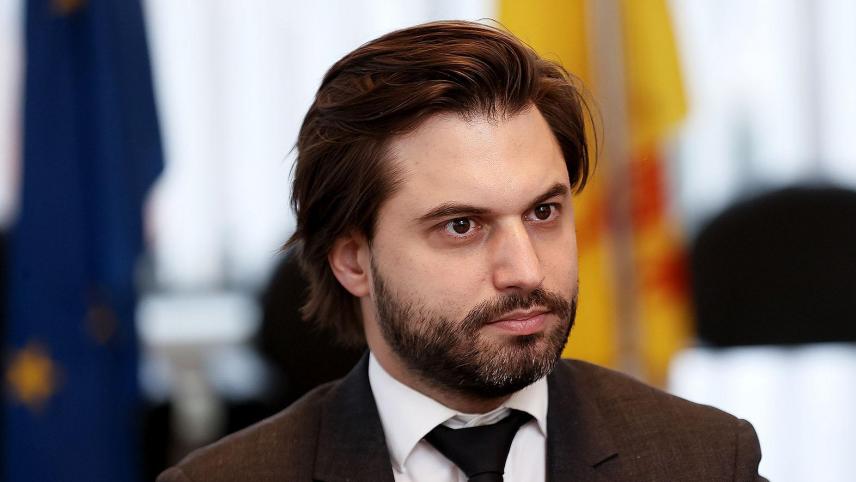Georges-Louis Bouchez, leader of Belgium's French-speaking liberal Mouvement Réformateur party, sparked controversy when he broke with convention by engaging with the leader of the far-right Flemish Vlaams Belang party, Tom Van Grieken.
The pair participated in a televised debate on Thursday that was meant to mimic the French presidential debate between Emmanuel Macron and Marine Le Pen.
Bouchez rejected criticism on Friday from French-speaking politicians and media outlets that denounced his contravention of the political agreement to not debate with the far-right.
Bouchez under fire
"Serious studies show that excluding far-right parties from debates makes them remain low at the polls," stressed Secretary of State Thomas Dermine from the French-speaking socialist party.
"Georges-Louis Bouchez knows this and today he is making a conscious choice to break this convention which is a well-established tradition on the French-speaking side,” Dermine told RTBF on Thursday evening.
François De Smet, leader of the social-liberal party Démocrate Fédéraliste Indépendant, took to Twitter to express his disappointment. “What will always differentiate the MR from DéFI... is respecting the exclusion of the extreme right,” Smet said.
Dans ce qui différenciera toujours le MR de DéFI, il conviendra d'ajouter, hélas, le respect du cordon sanitaire envers l'extrême droite. Et c'est triste. Vraiment. https://t.co/tQICojIYQ5
— François De Smet 🇪🇺🇺🇦 (@francoisdesmet) April 21, 2022
In his defence
Bouchez defended the move, saying "we fight (far-right parties) by debating and dismantling their arguments, not in a dead environment.”
He added that the debate was not live, making it possible to remove potentially polemic interactions. It was broadcast on the Flemish VRT channel where the political convention doesn't apply. Furthermore, Bouchez argued that thousands of French-speaking Belgians had watched the debate between Macron and Le Pen, also a far-right politician.
Related News
- What the French election says about Belgian politics
- Belgium Uncomplicated: 'Providing accessible, quality housing remains a major challenge'
- French election update: the rise of Le Pen
Liberal MP Els Ampe of Open VlD defended Bouchez, arguing that Vlaams Belang has significant support in Flanders which makes it important to tackle their policies: “Not talking to people is haughty. Georges-Louis Bouchez is snubbed by hypocrites for his audacity to defend liberal ideology vis-à-vis nationalist ideology."
Excluding the far-right
Political conventions in Flemish-speaking Belgium are quite different, with far-right politicians included in media debates for some time. Unlike in Wallonia, far-right parties have far greater political clout in Flanders.
And as populist movements have grown across the continent, French-speaking Belgian politicians chart a lonely course by not debating with far-right politicians. Only Sweden follows a similar policy, where politicians of all colours have an informal agreement to keep the far-right Swedish Democrats out of any government.
Yet this has led to political deadlock in the past when attempting to form a government.
Double standards?
Political journalist Betrand Henne posited that Bouchez may consider the convention of excluding the far-right obsolete. Henne wrote that the convention was created in 1999 to keep out parties that "attack the democratic principles on which our political system is based."
Yet Bouchez himself had previously criticised a debate between the leaders of the far-left PTB and far-right Vlaams Belang in 2019, stressing that for Mouvement Réformateur the convention was non-negotiable.
Ce qui est assez bizarre c’est que Georges Louis Bouchez avait lui même critiqué le débat entre le président du PTB et celui du Belang en 2019, en soulignant que le pour le MR le cordon sanitaire était non négociable.13/14
— Bertrand Henne (@BertrandHenne) April 22, 2022
The change in course could indicate a shift in political conventions in Belgium.

